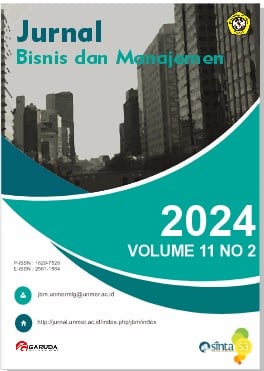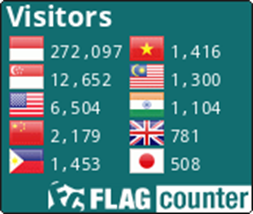The Effects of Spiritual Leadership and Transformational Leadership on Happiness at Work in the Digital 4.0 Era
DOI:
https://doi.org/10.26905/jbm.v11i2.14568Keywords:
Happiness at Work, Spiritual Leadership, Transformational LeadershipAbstract
Appropriate leadership will greatly affect happiness at Work, which will later affect the expected performance. This study used quantitative methods and measuring instruments using questionnaires distributed to respondents. The population in this study totaled 108 civil servants at the Regional Secretariat of the Karimun Regency Government. Meanwhile, in determining the number of samples in this study, the Slovin method was used to obtain a sample size of 85 employees who were used as respondents. The analysis test tool in this study was Smart-PLS software version 3.0 and IBM SPSS software version 26.0. They were supported using VOSviewer software to map the variables considered in this study. The results of this study indicate that Spiritual Leadership obtained insignificant negative results for Happiness at Work, while Transformational Leadership obtained significant positive results for Happiness at Work. As for Relevant Predictive, a value of 0.520 is obtained where this value is above zero, meaning that the observation value is good. As for the Fit Model, an NFI value of 0.669 was obtained, where this value was above zero, meaning that the model in this study was good.Downloads
References
Alén, E., Banerjee, B., & Gupta, B. (2017). Transformational Leadership and Creative Performance: A Dyadic Analysis of Salespeople and Their Supervisors. In Asian Journal of Business and Accounting (Vol. 10, Issue 1, pp. 201–233).
Asfahani, A., Abdurahman, A., Krisnawati, N., & Prusty, A. (2022). Innovative Solutions for AI Contribution in Developing Socially Inclusive Education for Children. Journal of Artificial Intelligence and Development, 1(2), 79–88.
Assen, M. F. van. (2018). Exploring the impact of higher management’s leadership styles on Lean management. Total Quality Management and Business Excellence, 29(11), 1312–1341. https://doi.org/10.1080/14783363.2016.1254543
Buil, I., MartÃnez, E., & Matute, J. (2019). Transformational leadership and employee performance: The role of identification, engagement and proactive personality. International Journal of Hospitality Management, 77(October 2017), 64–75. https://doi.org/10.1016/j.ijhm.2018.06.014
Çop, S. (2021). Achieving environmental sustainability through green transformational leadership policy: Can green team resilience help? Business Strategy and the Environment, 30(1), 671–682. https://doi.org/10.1002/bse.2646
Göçen, A. (2021). Spiritual Leadership and Organizational Citizenship Behavior: A Meta-Analysis. SAGE Open, 11(3). https://doi.org/10.1177/21582440211040777
Harbi, J. A. Al. (2019). Transformation leadership and creativity: Effects of employees pyschological empowerment and intrinsic motivation. Personnel Review, 48(5), 1082–1099. https://doi.org/10.1108/PR-11-2017-0354
Hildenbrand, K., Sacramento, C. A., & Binnewies, C. (2018). Transformational leadership and burnout: the role of thriving and followers’ openness to experience. In Journal of Occupational Health Psychology (Vol. 23, Issue 1, pp. 31–43). Educational Publishing Foundation. https://doi.org/10.1037/OCP0000051
Hunsaker, W. D. (2023). Spiritual Leadership and Work-life Balance. Journal of Management, Spirituality and Religion, 20(1), 27–52. https://doi.org/10.51327/HSSF4468
Jiang, J. (2023). From “doing alone†to “working togetherâ€â€”Research on the influence of spiritual leadership on employee morale. Frontiers in Psychology, 14. https://doi.org/10.3389/fpsyg.2023.992910
Khan, N. A. (2019). What followers are saying about transformational leaders fostering employee innovation via organisational learning, knowledge sharing and social media use in public organisations? Government Information Quarterly, 36(4). https://doi.org/10.1016/j.giq.2019.07.003
Krisnawati, N., Asfahani, A., & El-Farra, S. A. (2022). Impact of AI in Education and Social Development through Individual Empowerment. Journal of Artificial Intelligence and Development, 1(2), 89–97.
Lorinkova, N. M., & Perry, S. J. (2019). The importance of groupâ€focused transformational leadership and felt obligation for helping and group performance. In Journal of Organizational Behavior (Vol. 40, Issue 3, pp. 231–247). John Wiley & Sons, Ltd. https://doi.org/10.1002/JOB.2322
Ninković, S. R., & Florić, O. Č. K. (2018). Transformational school leadership and teacher self-efficacy as predictors of perceived collective teacher efficacy: In Educational Management Administration & Leadership (Vol. 46, Issue 1, pp. 49–64). SAGE PublicationsSage UK: London, England. https://doi.org/10.1177/1741143216665842
Nugraha, A. P. (2022). Pengaruh Kepemimpinan Transformasional, Keterampilan Kerja, Kepuasan Kerja Dan Efikasi Diri Terhadap Prestasi Kerja Melalui Keterlibatan Kerja Aparatur Sipil Negara Sebagai Variabel Intervening Pada Era Digital Kasus Di Pemerintah Daerah Kabupaten Karimun. Ibnu Sina.
Nugraha, A. P., Wibisono, C., Satriawan, B., Indrayani, Mulyadi, & Damsar. (2022). The Influence Of Transformational Leadership, Job Crafting, Job Satisfaction, And Self-Efficacy On Job Performance Through Work Engagement Of State Civil Apparatus As An Intervening Variable In The Digital Era Of Cases In The Local Government Of Karimun R. Central European Management Journal, 30(3), 2336–2693.
Pradhan, R. K. (2022). Being Nice Goes Long Way: Manifesting Compassion for Others Enacts in Experiencing Positive Emotions and Workplace Happiness for the Employees. Business Perspectives and Research. https://doi.org/10.1177/22785337221113157
Ravina-Ripoll, R. (2023). Mapping intrapreneurship through the dimensions of happiness at work and internal communication. Corporate Communications, 28(2), 230–248. https://doi.org/10.1108/CCIJ-03-2022-0037
Rifat, M., Ilham, I., Bayani, B., & Asfahani, A. (2023). Digital Transformation in Islamic Da’wah: Uncovering the Dynamics of 21st Century Communication. JIM: Jurnal Ilmiah Mahasiswa Pendidikan Sejarah, 8(3), 2933–2941.
Sain, Z. H., Asfahani, A., & Krisnawati, N. (2022). Utiliziation AI for Socially Responsive Education as a Path to Inclusive Development. Journal of Artificial Intelligence and Development, 1(2), 69–78.
Sanamthong, E. (2023). A Causal Model of Relationship between Organizational Climate Influencing Happiness at Work and Organization Engagement. Emerging Science Journal, 7(2), 558–568. https://doi.org/10.28991/ESJ-2023-07-02-018
Sugiyono. (2016). Mеtodе Pеnеlitiаn Bisnis : Pеndеkаtаn Kuаntitаtif, Kuаlitаtif dаn R&D. Bаndung: Ðlfаbеtа Usmаn,. Jurnal, 47(1), 172–180.
Sugiyono. (2018). Metode Penelitian Kuantitatif,Kualitatif dan R&D. In ke-26.
Sugiyono, P. D. (2020). Metode Penelitian Kuantitatif Kualitatif dan R&D, Cetakan Keempat. Alfabeta.
van Eck, N. J., & Waltman, L. (2020). VOSviewer Manual version 1.6.16. Univeristeit Leiden, November, 1–52.
Wang, M. (2019). The effect of spiritual leadership on employee effectiveness: An intrinsic motivation perspective. Frontiers in Psychology, 9. https://doi.org/10.3389/fpsyg.2018.02627
Wu, X. (2020). Positive spiritual climate supports transformational leadership as means to reduce nursing burnout and intent to leave. Journal of Nursing Management, 28(4), 804–813. https://doi.org/10.1111/jonm.12994
Yang, F. (2019). Feeling Energized: A Multilevel Model of Spiritual Leadership, Leader Integrity, Relational Energy, and Job Performance. Journal of Business Ethics, 158(4), 983–997. https://doi.org/10.1007/s10551-017-3713-1
Zhu, Y. (2022). Spiritual Leadership, Autonomous Motivation and Employee Craftsmanship Spirit: The Cross-Level Moderating Effect of Caring Ethical Climate. Psychology Research and Behavior Management, 15, 1971–1988. https://doi.org/10.2147/PRBM.S358107
Downloads
Published
How to Cite
Issue
Section
License
Authors who publish with this journal agree to the following terms:
(1) Copyright of the published articles will be transferred to the journal as the publisher of the manuscripts. Therefore, the author confirms that the copyright has been managed by the journal.
(2) Publisher of Jurnal Bisnis dan Manajemen is University of Merdeka Malang.
(3) The copyright follows Creative Commons Attribution–ShareAlike License (CC BY SA): This license allows to Share — copy and redistribute the material in any medium or format, Adapt — remix, transform, and build upon the material, for any purpose, even commercially.














